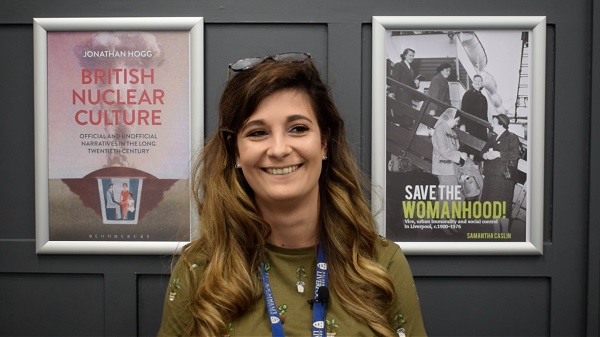
Emily Gibbs is a postgraduate research student in the Department of History, specialising in the anxieties felt by British society during the Cold War. Find out Emily's thoughts on studying a PhD at the University: from her topic of study to the city of Liverpool.
Why did you choose your topic of study?
I'm really interested in the British Cold War. In particular I'm really interested in the emotions that everyday people felt in Britain to do with nuclear weapons and nuclear power. So I'm really interested in ideas and feelings of nuclear anxiety and nuclear fear.
Why did you decide to study at postgraduate level?
I decided to study at postgrad level because I did my undergrad degree here. In the second year of my undergrad I realised that I really enjoyed university and I really enjoyed History. I decided to do my Masters and then to come back again to do my PhD because I want to be a lecturer and teach.
What are the challenges of studying at postgraduate level and how do you manage these challenges?
The first thing would be motivation. When you’re doing a PhD you’re on your own, you’re the only person in the world doing the research that you’re doing because you’re part of this ground-breaking field of research. I try to make myself little lists at the beginning of every day and tick them off, and that helps me to stay motivated and keep going throughout the day and get that last chapter written up.
The other thing is loneliness, again because you are the only person doing it. We do have a communal office here but obviously not everybody is there all the time. I actually joined the archery club here at the University during my PhD so it meant I was seeing people every week to try and keep myself sane!
What do you think of the supervisor support you’ve received as a postgraduate?
The supervisor support for my PhD has been really good. I’m very lucky that my PhD supervisor currently was also my supervisor at undergrad and also my Masters, so I’ve had the same supervisor support for a long time. But honestly, everyone here at the Department is really friendly and really helpful and really encouraging to help me find the training and resources I need to try and move forward onto the next part of my career.
Why did you choose to study at the University of Liverpool?
I chose to study at the University of Liverpool because of an Open Day. Back when I was doing my A-Levels I came on an Open Day here and I just really liked the Department. The lecturers were really friendly, I fell in love with the city and I’m still here nine years later!
What opportunities have been available to you while you've been studying your PhD at the University of Liverpool?
I have had loads of opportunities which have appeared while I have been doing my PhD at Liverpool. A lot of these have come from the University itself, or through PhD or academic networks, or through the NWCDTP (North West Consortium Doctoral Training Partnership) which funds my research. So for example, I have had loads of opportunities to go to conferences; I went to a History of Emotions one in London, and I recently went to Belfast for one on Urban History. In my first year, my supervisor actually organized a Nuclear Culture Workshop here in Liverpool so I got to attend that very early in my research, which meant that I met a lot of academics in the field and got a lot of advice early on. The History Department also offers lots of training for PhD students, from how to get your work published to giving papers to using social media in an effective way. They have all been really helpful in teaching me the skills to actually do my PhD and to undertake the research but also meeting people within my field and other PhD researchers or early career academics who have been helping me as I navigate the academic job market myself. Also I have had a lot of opportunity from the NWCDTP. This summer for example I am going to work with the National Library of Scotland in Edinburgh on a Policy Internship over the Summer which will be really great and interesting. I can't wait!
Discover more
- Study History with the University of Liverpool